Pakistan recently moved to purchase six advanced submarines, with air independent propulsion technology, from China. In an email interview, Vijay Sakhuja, research director at the Indian Council of World Affairs, discussed Pakistan’s naval capabilities. WPR: What is the current state of Pakistan’s navy? Vijay Sakhuja: Pakistan’s naval planners have been proactive in attempting to achieve parity and at times superiority over the Indian navy. They have consistently endeavored to introduce newer and more-advanced platforms to the subcontinent, including submarines capable of launching missiles, long-range maritime patrol aircraft, helicopters fitted with anti-ship missiles and more recently the air independent propulsion system […]
Asia-Pacific Archive
Free Newsletter
Russia and India recently announced that they are cooperating on developing joint liquefied natural gas projects. In an email interview, Jörg Himmelreich, a senior fellow at the German Marshall Fund of the United States, discussed energy relations between Russia and India. WPR: Historically, what has been the energy relationship between Russia and India? Jörg Himmelreich: India and Russia have a formal strategic partnership dating back to the Cold War, when they were each other’s single most important partner. Even after the demise of the Soviet Union, they enjoyed traditionally good relations, although the resulting fundamental shift in the global order […]
India and the European Union have reportedly hit a snag in their long-running negotiations over a free trade agreement, hoped to boost bilateral trade by nearly $30 billion. Initially slated for signature in early April, the agreement now appears to have been postponed until 2012. One of the key sticking points in the negotiations is a proposal to enhance intellectual property protections for medicine. India has a thriving generic drug industry. It did not allow patents on pharmaceutical products until 2005, when it adapted its laws to conform with the World Trade Organization’s intellectual property rules. Products produced prior to […]
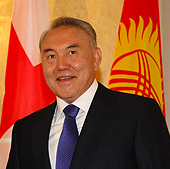
Kazakhstan’s oil and gas reserves, as well as its pivotal location, make it of strategic importance to the United States and its allies. But in the run-up to Kazakhstan’s presidential election later this week, the country’s contested democratic practices and uncertain transition to the next generation of political leaders leaves its future unclear. Unfortunately, due to Washington’s preoccupation with the Middle East, North Africa and Afghanistan, both Kazakhstan and its upcoming election run the risk of being largely overlooked. Last month, Kazakh President Nursultan Nazarbayev rejected the idea of using a national referendum to extend his term until 2020, despite […]
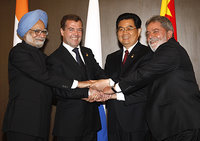
The U.S.-led intervention in Libya is now in full swing, thanks to a 10-0 vote by the U.N. Security Council in favor of authorizing military force. But the seeming unanimity of the vote belies key abstentions from a wary Germany as well as Brazil, Russia, India and China — the four emerging economic powers known as the BRICs. The BRICs’ abstentions raise difficult questions about the future of a rules-based international order at a time of relative U.S. decline. The BRICs’ move seemed to be grounded in their longtime allergy to Western-led military operations. Couched in language of humanitarian concern, […]
Last week it seemed like even the intervention of U.S., British and French airpower might not be enough to enable the Libyan rebellion to regain the momentum against Libyan government forces. Now it looks like the balance has shifted in the rebels’ favor, if not yet decisively so. For me, as a supporter of the intervention, that makes this week an even better moment than last to emphasize that we should not be judging the wisdom of our involvement based on the latest isolated news accounts from the front, and that it is wildly premature to assess any ultimate outcomes. […]

While many in the West fret over the challenge of “rebalancing” the global economy after the recent global financial crisis, several trends suggest that the field of supply chain management could offer a key advantage for an America eager to double its exports by 2014. On the surface, supply chain management might not sound too sexy, but understand this: In today’s globalization, neither companies nor countries compete — supply chains do. Companies like Wal-Mart have known this for some time. Thus, positioning America to be the world’s pre-eminent provider of secure, transparent and efficient supply chains will ensure that our […]
India and Taiwan recently began the process of considering a free trade agreement. In an email interview, Mukul G. Asher, discussed India-Taiwan economic relations. WPR: What is the extent of Taiwan-India trade relations? Mukul G. Asher: In 2010, the bilateral merchandise trade between India and Taiwan was valued at $6.5 billion, making India Taiwan’s 16th-ranked global trade partner and accounting for only 1.2 percent of Taiwan’s and 1.6 percent of India’s global trade. The balance of trade is in Taiwan’s favor by $800 million. Data for trade in services are not published on a bilateral basis. WPR: What is driving […]

NEW DELHI — In India’s vibrant capital, food seems to be everywhere — from bustling fruit and vegetable markets and greasy kebab stalls, to sumptuous platters in rooftop restaurants and dilli ki chaat, Delhi’s ubiquitous street snacks. Poor street vendors and high-end chefs alike offer a multitude of culinary options to keep the city — and its array of visiting tourists, diplomats and business leaders — well-fed. Yet behind this apparent culinary prosperity lies rampant food insecurity. Food-related inflation in India soared above 18 percent in December, sparking street protests over high onion prices. Today, food-related inflation remains high, at […]
A number of attempts to create alternatives to the U.S. Global Positioning System are underway. Russia is close to completing its GLONASS system, which India plans to join, while China is working on developing its own system. In an email interview, Charles Vick, senior technical and policy analyst for GlobalSecurity.org, discussed global satellite navigation systems. WPR: What countries are currently pursuing a global navigation satellite system (GNSS) capability and what is the status of their programs? Charles Vick: The Global Positioning System (GPS), the global navigation system developed by the U.S., remains the primary system used by both the military […]
Brazil and India recently signed an agreement to improve air travel between the two countries, the latest small step in a broad bilateral relationship. In an email interview, Oliver Stuenkel, a fellow at the Global Public Policy Institute in Berlin, discussed Brazil-India relations. WPR: What is the state of trade between Brazil and India, including areas of complementarity and competition? Oliver Stuenkel: Trade between Brazil and India has grown significantly since the end of the Cold War, from $400 million in 1999, to $2 billion in 2005, passing $7 billion in 2010. A trade agreement between Mercosur — a regional […]
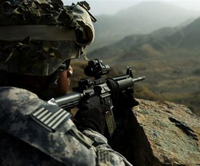
The military operation that the U.S., the U.K. and France have launched against Libyan leader Moammar Gadhafi thus far lacks a clear set of strategic goals. The coalition partners cannot agree regarding whether the operation is intended to remove Gadhafi, to support rebel operations against Gadhafi loyalists or simply to protect civilians from attack by Gadhafi’s military forces. The lack of a strong, well-defined set of strategic objectives means that military operations in and over Libya are likely to be incoherent. All this is bad enough, but perhaps worse is that there is little indication that France, the U.K. or […]

There is no popular or expert consensus about which actors possess economic power in the 21st century. Public uncertainty is reflected in the April 2010 Pew Global Attitudes survey, which reveals interesting cross-country discontinuities in the perception of power. When asked to identify “the world’s leading economic power,” a majority of respondents in a diverse array of developing countries — including Brazil and India — name the United States. On the other hand, in the developed world, the results look dramatically different, with strong pluralities in five of the original G-7 economies — including the United States, Japan and Germany […]

One of the most revealing features of today’s international system is that only two nations, America and China, possess sufficient power to truly disrupt it — either directly, through the application of military force, or indirectly, by unleashing an uncontainable economic crisis. In fact, to truly derail globalization in its current trajectory, the two would need to act in concert, either by fighting each other directly or experiencing simultaneous economic collapses. Short of those two scenarios, modern globalization remains highly resilient to shocks of all sorts. That resilience is the only power that really matters in this world. It defines […]
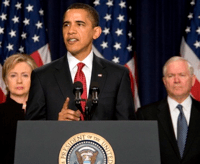
For many years, the United States has been the world’s most powerful nation. It remains the undisputed global leader in military power and still possesses vast economic and cultural influence. And while Washington’s ability to combine both hard and soft power to influence world events — what Joseph Nye calls “smart power” — has diminished somewhat, it is still in a far superior position relative to any other country. U.S. primacy, however, comes with opportunity costs. An alternate path might have delivered a comparable level of security at far less expense and risk. Even many who unabashedly celebrate our 20-year […]
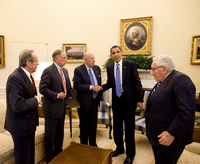
For decades now, strategic experts have predicted that our world was on the verge of a break-out in nuclear proliferation that would see us grappling with two- or three-dozen nuclear powers. Indeed, the inexorable spread of nuclear weapons is the closest thing to an unassailable canon in the field of international relations, as one cannot possibly employ the term “nuclear proliferation” without preceding it with the modifier “increasing.” This unshakeable belief, wholly unsupported by any actual evidence, drives many Cold War-era “wise men” to argue that mutually assured destruction (MAD) and strategic deterrence in general are obsolete and therefore immoral […]
In addition to spreading across the region, the Arab uprisings are inspiring peaceful demonstrations away from the Middle East — perhaps most notably, albeit with little international news coverage, in the former Soviet bloc country of Armenia. More than 10,000 anti-government protesters rallied last week in the capital, Yerevan, where according to the Associated Press, opposition leader and former President Levon Ter-Petrosian claimed the demonstration was inspired by the revolts in the Arab world. Outcry has mounted since Serzh Sargsyan, a former prime minister, became the nation’s third president in a disputed 2008 election, the immediate aftermath of which was […]
